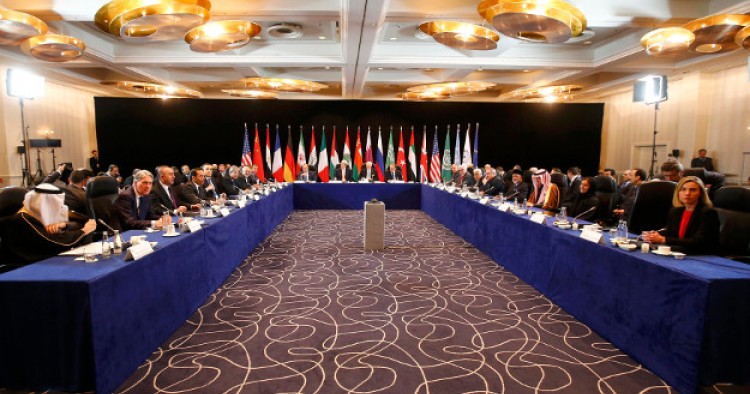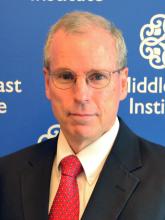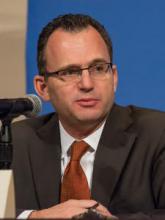In this week's Monday Briefing, MEI experts Robert S. Ford, Randa Slim, Paul Salem, and Alex Vatanka provide analysis on recent events including Tuesday's meeting of the International Syria Support Group in Vienna, the death of Hezbollah senior leader Mustafa Badreddine, the global Refugee Summit to be held in Istanbul, and Indian PM Modi's upcoming visit to Iran.
I.S.S.G. Meeting to Renew Syria Cease-Fire
Robert S. Ford, Senior Fellow
Secretary of State John Kerry will use the International Syria Support Group meeting in Vienna on Tuesday to mobilize foreign states to convince the warring Syrian government and opposition to accept a renewed cessation of violence. Prospects are slim.
The Russian government either lacks intent or leverage to compel President Bashar al-Assad to stop attacking armed opposition groups and bombing towns they control. Moscow hasn’t even convinced Damascus to allow humanitarian aid convoys reach many besieged communities. Iranian influence appears greater than that of Russia as Iran keeps sending fighters, Iranian and foreign, to the battlefield. On other side, the Saudi Arabia keeps stressing that Assad must go either through negotiation or military defeat. Hopefully Austrian protocol will seat the Saudis well away from the Iranians at the Vienna table. Turkey has been less vocal about Assad’s departure than the Saudis, but appears no less committed.
Thus, while the Vienna meeting may announce yet another cessation of hostilities, it seems unlikely to endure. Both sides in the Syrian conflict, and their foreign patrons, are still more committed to winning militarily than to making mutual concessions to get a political deal. The more moderate armed opposition dislikes the al-Qaeda affiliated Jabhat al-Nusra, but when forced to choose, it prefers working with Nusra to working with the Syrian government. The sustained bombings and fighting, along with sieges of entire towns, prevent any serious political discussion. Until the warring sides tire, no cessation of hostilities, let alone peace talks, has much chance of success.
Hezbollah’s Dead-Men Walking
Randa Slim, Director of the Initiative for Track II Dialogues
Hezbollah’s number two, Mustafa Badreddine, lived and died by the sword. All of Hezbollah’s senior leaders, military and political, know they are dead men walking. Since 1982 when Hezbollah was formed, its list of enemies has expanded and that of its allies has shrunk. Too many parties are targeting them; eventually some of these plots will succeed.
The fact that these assassination attempts are successful strongly point to Hezbollah’s weakened internal security mechanisms in Syria. In more ways than one, Syria is now more a strategic liability than a strategic depth for Hezbollah.
Hezbollah has several senior leaders whose deaths it wants to avenge. Similar to his cousin and mentor Imad Mughniyeh, Badreddine’s revenge target will neither be low-level nor quickly achieved. Not for the lack of trying, Hezbollah has still not avenged Mughniyeh’s 2008 assassination. Syria’s civil war is now the theater where Hezbollah’s men, political capital and any remaining shred of its moral claim of being a party founded on the principles of resistance, social justice and fighting for the rights of the oppressed, are being crushed. Despite Hassan Nasrallah’s many claims of an imminent victory in Syria, the fight keeps dragging on and claiming more lives of young Lebanese Shiites who are being sent to Syria to fight for the survival of a brutal dictatorship.
In the short-term, Badreddine’s death will garner Hezbollah feelings of sympathy inside its core constituency. In the long-term, it will add to feelings of disgruntlement as to whether the fight in Syria, which they have been promised would end soon, is worth the men it is losing. Still, this disgruntlement is far from reaching a tipping point that would force Hezbollah to reassess its military involvement in Syria.
Global Refugee Summit in Istanbul
Paul Salem, Vice President for Policy and Research
The first ever world humanitarian summit will be held under U.N. auspices in Istanbul on May 23-24. In 1975, the UNHCR identified 2.5 million refugees in need globally; today, the number is 60 million. Russian President Vladimir Putin has already announced he won’t attend, fearing pressure over Russian actions in Syria.
One of the key issues in the meeting will be strengthening assistance to the 4.9 million Syrian refugees and their host countries of Turkey, Lebanon and Jordan. The meeting comes after the E.U.-Turkish refugee deal that was reached in March, the London donor conference in February that raised over $10 billion in pledges for Syrian refugees and their host countries in the Middle East, and the spring meetings of the World Bank that raised more than $1 billion.
The World Bank meetings emphasized that assistance needed to move from short-term humanitarian assistance to long-term development assistance. Refugees were likely to be in host countries for a long time, and the best way to provide jobs, health care and education to these refugees is to help their host countries grow their economies and boost their social services networks.
The host countries in the region are providing a global public good in absorbing high numbers of Syrian refugees. Other countries around the world should carry their weight both in terms of absorbing more refugees themselves and in providing highly needed humanitarian and development aid to the host countries in the region. Of course, ending the Syrian war is the most urgent priority, but even then, the needs of millions of refugees and internally displaced people will remain challenging. In the meantime, the Istanbul meeting is an historic occasion to develop effective global approaches to the current refugee crisis.
Modi’s Upcoming Iran Visit
Alex Vatanka, Senior Fellow
India’s Prime Minister Narendra Modi’s visit to Iran on May 22 follows his state visits in the past year to the United Arab Emirates and Saudi Arabia. Modi’s visit to Tehran is considered by the Indian foreign policy establishment as a necessary balancing act to safeguard Delhi’s various interests in west Asia that are impacted by the Arab-Iranian rivalry.
However, Modi’s trip to Tehran is also aimed to spur specific economic and trade cooperation and particularly joint pan-regional infrastructure projects. An immediate task is to pave the way for India to repay $6.5 billion it owes Iran for crude oil already received. Delhi has for months cited international banking sanctions on Iran as the obstacle, but statements from Tehran suggest this argument has left the Iranians less than convinced.
Besides such damage control, Modi will push for two long-term projects: first, to sign a contract to develop Farzad-B, an Iranian gas field discovered in 2008 by Indian firms, but left undeveloped due to nuclear-related sanctions on Iran; second, to finalize a number of agreements for Indian investment in Iran’s Chabahar port, a strategic conduit that is hoped by Delhi to open up Afghan and Central Asian markets to Indian business interests. The port is also the key rival to nearby Gwadar, an emerging port project in Pakistan that is financed and developed largely by the Chinese.
While post-sanction Iran both as a market and regional partner cannot be neglected by India, Modi will seek to strike a convincing balance between Delhi’s various Iranian and Arab interests.
The Middle East Institute (MEI) is an independent, non-partisan, non-for-profit, educational organization. It does not engage in advocacy and its scholars’ opinions are their own. MEI welcomes financial donations, but retains sole editorial control over its work and its publications reflect only the authors’ views. For a listing of MEI donors, please click here.
















